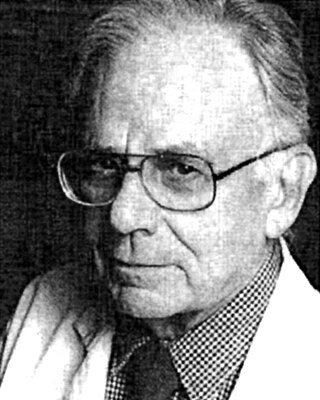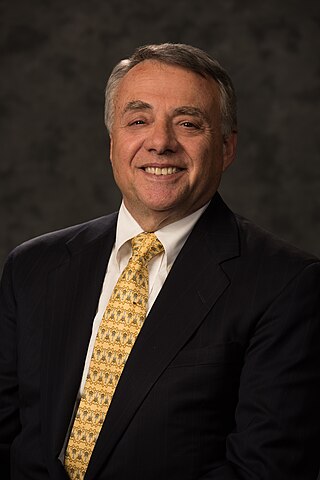Related Research Articles

Pathology is the study of disease. The word pathology also refers to the study of disease in general, incorporating a wide range of biology research fields and medical practices. However, when used in the context of modern medical treatment, the term is often used in a narrower fashion to refer to processes and tests that fall within the contemporary medical field of "general pathology", an area that includes a number of distinct but inter-related medical specialties that diagnose disease, mostly through analysis of tissue and human cell samples. Idiomatically, "a pathology" may also refer to the predicted or actual progression of particular diseases. The suffix pathy is sometimes used to indicate a state of disease in cases of both physical ailment and psychological conditions. A physician practicing pathology is called a pathologist.

Anatomical pathology (Commonwealth) or anatomic pathology (U.S.) is a medical specialty that is concerned with the diagnosis of disease based on the macroscopic, microscopic, biochemical, immunologic and molecular examination of organs and tissues. Over the 20th century, surgical pathology has evolved tremendously: from historical examination of whole bodies (autopsy) to a more modernized practice, centered on the diagnosis and prognosis of cancer to guide treatment decision-making in oncology. Its modern founder was the Italian scientist Giovanni Battista Morgagni from Forlì.

Forensic pathology is pathology that focuses on determining the cause of death by examining a corpse. A post mortem examination is performed by a medical examiner or forensic pathologist, usually during the investigation of criminal law cases and civil law cases in some jurisdictions. Coroners and medical examiners are also frequently asked to confirm the identity of remains.

Johannes Andreas Grib Fibiger was a Danish physician and professor of anatomical pathology at the University of Copenhagen. He was the recipient of the 1926 Nobel Prize in Physiology or Medicine "for his discovery of the Spiroptera carcinoma". He claimed to have shown that the roundworm which he called Spiroptera carcinoma could cause stomach cancer in rats and mice. His experimental results were later proven to be a case of mistaken conclusion.

Invasive carcinoma of no special type, invasive breast carcinoma of no special type (IBC-NST), invasive ductal carcinoma (IDC), infiltrating ductal carcinoma (IDC) or invasive ductal carcinoma, not otherwise specified (NOS) is a disease. For international audiences this article will use "invasive carcinoma NST" because it is the preferred term of the World Health Organization (WHO).

Tharman Shanmugaratnam is a Singaporean politician and economist who has been the current and ninth president of Singapore since 2023.

Nasopharyngeal carcinoma (NPC), or nasopharynx cancer, is the most common cancer originating in the nasopharynx, most commonly in the postero-lateral nasopharynx or pharyngeal recess, accounting for 50% of cases. NPC occurs in children and adults. NPC differs significantly from other cancers of the head and neck in its occurrence, causes, clinical behavior, and treatment. It is vastly more common in certain regions of East Asia and Africa than elsewhere, with viral, dietary and genetic factors implicated in its causation. It is most common in males. It is a squamous cell carcinoma of an undifferentiated type. Squamous epithelial cells are a flat type of cell found in the skin and the membranes that line some body cavities. Undifferentiated cells are cells that do not have their mature features or functions.
Gastrointestinal pathology is the subspecialty of surgical pathology which deals with the diagnosis and characterization of neoplastic and non-neoplastic diseases of the digestive tract and accessory organs, such as the pancreas and liver. The gastrointestinal tract is part of the digestive system or alimentary tract, and follows the passage of food and liquids as they pass through the body. The organs included in the gastrointestinal tract include the mouth, the throat (pharynx), esophagus, stomach, small intestine, large intestine, rectum and anus, in that order.

Stephen Stanley Sternberg was an American surgical pathologist, who worked at the Memorial Sloan-Kettering Cancer Center for his entire career.
Vasant Ramji Khanolkar, better known as V. R. Khanolkar, was an Indian pathologist. He made major contributions to the epidemiology and understanding of cancer, blood groups, and leprosy. He has been called the "Father of Pathology and Medical Research in India."
Basaloid large cell carcinoma of the lung, is a rare histological variant of lung cancer featuring certain distinctive cytological, tissue architectural, and immunohistochemical characteristics and clinical behavior.
The Yong Loo Lin School of Medicine, established in 1905, is the first institution of higher learning in Singapore and the genesis of the National University of Singapore. The School is one of many who offer medical programmes in the Asia Pacific region. The Times Higher Education World University Rankings 2019 by subject and Quacquarelli Symonds (QS) World University Rankings by Subject 2019 list NUS Medicine as the leading medical school in Asia. Its distinguished alumni include cabinet ministers of Singapore, well-known doctors and a Prime Minister of Malaysia and father of the president-elect of Singapore.

John Obafunwa is a Nigerian medical expert, pathologist, lawyer, author and former Vice-Chancellor of Lagos State University.
Prem Nath Wahi (1908–1991) was an Indian pathologist, writer, medical academic and the director general of the Indian Council of Medical Research. He was a fellow of the Royal College of Physicians of London, a founder fellow of the National Academy of Medical Sciences and a recipient of Dr. B. C. Roy Award and the Padma Bhushan.

Miguel A. Sanchez is a board-certified pathologist who specializes in anatomic pathology, clinical pathology and cytopathology. Sanchez is chief of pathology and medical director of The Leslie Simon Breast Care and Cytodiagnosis Center at Englewood Hospital and Medical Center in Englewood, New Jersey. He is best known for his contribution in setting the standards of diagnosis and treatment of breast and thyroid disease praised by the United States Congress in 1994.

Anthony J Gill is an Australian pathologist, professor of surgical pathology at the University of Sydney and the chairman of the Australian Pancreatic Cancer Genome Initiative - part of the International Cancer Genome Consortium. Most of his research is focused on translating the improved understanding of cancer gained at the basic science level into clinically useful diagnostic tests which can be applied in the routine surgical pathology laboratory.

Narinder Kumar Mehra is an Indian immunologist, head of the department of transplant immunology and immunogenetics of the SRL Limited, Gurgaon. He is a former dean of research and holds the ICMR Dr. C.G. Pandit National Chair at AIIMS. An elected fellow of the International Medical Sciences Academy, The World Academy of Sciences, Indian National Science Academy and National Academy of Sciences, India, Mehra is known for his research on histocompatibility and immunogenetics. The Council of Scientific and Industrial Research, the apex agency of the Government of India for scientific research, awarded him the Shanti Swarup Bhatnagar Prize for Science and Technology, one of the highest Indian science awards for his contributions to Medical Sciences in 1992. He received the Chevalier of the National Order of Merit from François Mitterrand in 2003.
George Sai Wah Tsao was a professor of the School of Biomedical Sciences of the University of Hong Kong and the Director of the Faculty Core Facility of the Faculty of Medicine, the University of Hong Kong. Tsao researches the relationship between Epstein-Barr virus and nasopharyngeal carcinoma. He also created the first immortal human ovarian surface epithelial cell line.
Pelayo Correa is a Colombian pathologist.

Richard James Cote is a pathologist, academic and author. He is the Edward Mallinckrodt Professor and Chair of the Department of Pathology and Immunology at Washington University in St. Louis School of Medicine, and the Pathologist-in-Chief at Barnes Jewish Hospital.
References
- 1 2 3 4 5 Sim, Shuzhen (30 July 2018). "Renowned Pathologist K. Shanmugaratnam Dies At 97 (In Memoriam)". Asian Scientist . Retrieved 1 August 2018.
- 1 2 "Commemorating 50 Years of the Singapore Cancer Registry and the Legacy of Professor K Shanmugaratnam". National University of Singapore Saw Swee Hock School of Public Health. 12 December 2019.
- 1 2 "Tamils in Federated Malaya and Singapore". Daily News . 19 February 2016.
- 1 2 "Queen's Fellowship". Indian Daily Mail. National Library Board NewspaperSG Digital Archives. 9 January 1954.
- ↑ "Speech by Mr Gan Kim Yong, Minister for Health, at the launch of the Singapore Cancer Registry 50th Anniversary monograph, 25 Nov 2019". Ministry of Health. 25 November 2019.
- ↑ "Building A Treasure Chest Of Medical Data". Asian Scientist . 23 March 2016.
- ↑ "About Us — Past Masters & Honorary Fellows". Academy of Medicine, Singapore.
- ↑ Quah, Jipson (March 2017). "The Path of Making History – Interview with Prof Chew Chin Hin". SMA News. Singapore Medical Association.
- 1 2 Tock, Edward P.C. "Citation on Emeritus Professor K Shanmugaratnam, SMA Honorary Member" (PDF). Singapore Medical Association . Retrieved 1 August 2018.
- ↑ Ng, Keng Gene (29 July 2018). "Founder of Singapore Cancer Registry K. Shanmugaratnam dies aged 97". The Straits Times . Retrieved 1 August 2018.
- ↑ Tan, Martino (29 July 2018). "Kanagaratnam Shanmugaratnam, founder of S'pore Cancer Registry & father of DPM Tharman, dies". mothership.sg. Retrieved 1 August 2018.
- ↑ "Shanmugaratnam Kanagaratnam". National University of Singapore . Retrieved 1 August 2018.
- ↑ "Portrait of Dr. K. Shanmugaratnam, Master of Academy of Medicine in Singapore". National Library Board . Retrieved 1 August 2018.